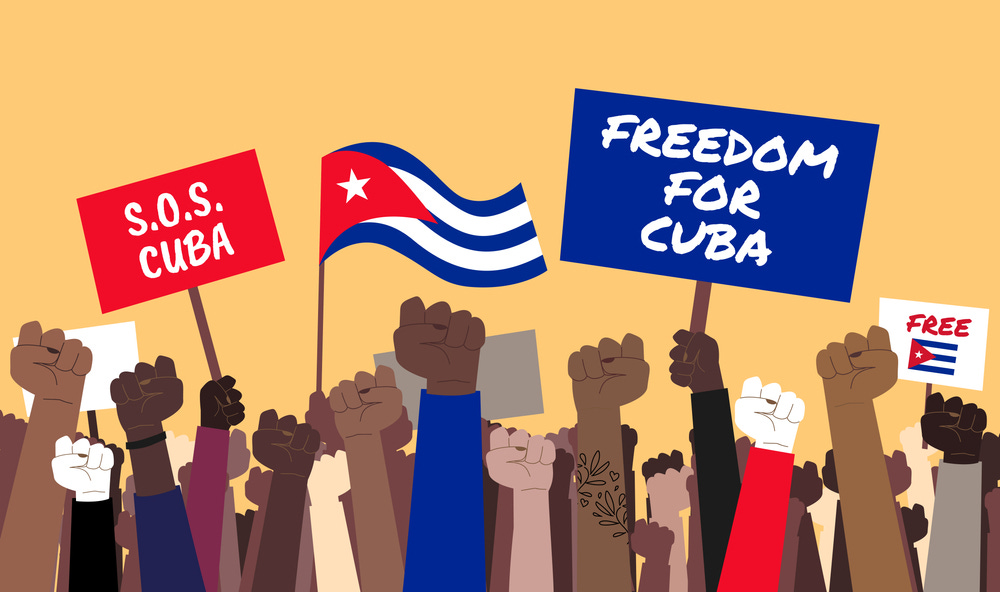E-Pluribus | November 12, 2021
Is American contemplating suicide, "class warfare" Republicans, and what happened after the Cuban protests over the summer?
A round up of the latest and best writing and musings on the rise of illiberalism in the public discourse:
Gustav Jönsson: Will America Take Its Own Life?
Is America slowly committing suicide? This is the central question of George Packer’s book The Last Hope, which Gustav Jönsson reviews at Arc Digital. Jönsson describes Packer’s bleak outlook for the future of the American republic given political polarization, institutional failure, and a declining civic-mindedness. Although, Jönsson finds room for hope in Packer’s assessment: if most ordinary Americans hold on to common decency, then the republic may survive.
Packer looks at America and finds it riven by competing factions in vicious culture wars—he sees how civic-spiritedness has evaporated, how formerly well-functioning institutions have crumbled, how the elites have discredited themselves while rising inequality has vitiated the middle classes. Americans no longer think of the common good or strive towards a common purpose; the county has been beset by political polarization. The very idea of America is at risk of dying. None of this is new to those who follow U.S. politics, but Packer (for the most part) puts it well.
Instead of a shared national narrative America now has four separate narratives—Packer calls them Just America, Smart America, Real America, and Free America. Free America represents libertarianism and the “Don’t tread on me” attitude. Its intellectual heroes are Hayek and Friedman, and since Reagan it has been strong among Republicans. Those who inhabit Just America care fiercely about social justice. This narrative has gripped the Democratic Party in recent years. Smart America is the meritocrat’s America. It flourishes among highly educated professionals—people with outsize cultural influence. And finally, the narrative of Real America is characterized by anti-intellectualism and the belief that “the heart of democracy beats hardest among the common people who work with their hands.” Sarah Palin is its outstanding representative. Packer—being the moderate bien pensant—tells us that there is some truth to each narrative.
What’s gone wrong, Packer thinks, is that rising inequality has eroded “the common faith” that Americans need to create a successful pluralist republic. “The post-industrial era has concentrated political and economic power in just a few hands and denied ordinary people control over their own lives,” he writes. The consequence is that “Americans can no longer think and act as fellow citizens.” Instead, people “look for answers in private panaceas, fixed ideas, group identities, dreams of future and the past, saviors of different types—everywhere but in ourselves.” This is well put, and Packer is in consistently fine form when he identifies the country’s ills.
Read the full review here.
Peter Savodnik: The Rise of the Republican Class Warrior
While at Pluribus we may view the solution to the conundrum Parker identifies in his book as a recommitment to small “l” liberal and pluralistic values, increasingly, many Republicans and conservatives have embraced nationalism and populism as the only path forward to reclaiming American greatness. As Peter Savadnik points out at Bari Weiss’s Substack, this ideological shift also includes a departure from how the GOP traditionally promoted - if only rhetorically - free markets and private enterprise as key to prosperity.
What they really are is nationalists, and the fear that binds them together is that the nation—the American people—is falling apart, succumbing to its many economic and political fissures, splintering, losing its sense of self. To the extent that they sound like class warriors, that’s not only because they’re angry with the corporations that have outsourced jobs and replaced humans with robots. It’s because those corporations—like so many American institutions—have embraced a left-wing identity politics that, in their view, conflicts with middle- and working-class values.
[ . . . ]
This is a politics that is unconcerned with abstract debates—about markets, freedom, the relationship between the state and the individual—and focused squarely on the middle-class values that, Republicans insist, Democrats have abandoned. It’s a GOP that imagines itself, increasingly, fending off the powerful on behalf of the less powerful, doing battle with all the titanic forces conspiring against The People: cheap labor, automation, the decline of the family, fentanyl, the Chinese Communist Party, the tech lords, the streaming services, the racialization of everything.
[ . . . ]
The world we are in, the world against which Trump revolted and Republicans are still revolting, is shaped by a tacit and unacknowledged alliance between the Democratic Party, the universities, Hollywood, tech, legacy media outlets like The New York Times and CNN, and most publicly traded companies in the United States. This alliance is nudging millions of Americans into sharing particular opinions, posting particular memes or articles—wrapping themselves in the new all-consuming monoculture.
Read the full piece here.
James Bloodworth: Cuba, Four Months Later
Over the summer, as the pandemic was raging and the Cuban regime proved incapable of providing essential goods and services to its citizens, large numbers of Cubans took to the streets in protest for the first time in decades. But after the government cracked down, news coverage abated, and the future for the Cuban people remains unclear. At Persuasion, James Bloodworth provides an update on where things stand.
The economic situation in Cuba has been dire for many decades, but Covid-19 delivered a sharp blow to the Cuban economy by shuttering the island’s tourist industry, one of the country’s primary sources of hard currency. Though Cuba was praised internationally for its initial Covid-19 efforts that kept case numbers relatively low, a rush to re-open the island to tourists in 2021 brought cases of the especially contagious Delta variant. By July of this year, Cuba had the highest rate of Covid-19 cases in the Americas. The country’s vaunted healthcare system was overwhelmed with Covid patients and reportedly close to collapse in parts of the country. The combined economic and health disasters fueled a wave of discontent which finally erupted in the July protests.
Though the protests exposed a previously unseen level of disaffection with the Cuban communist regime, they were also disorganized and lacked ideological coherence. There is no official opposition in Cuba, and the government has successfully infiltrated even mildly critical opposition movements with its network of spies.
As long as members of the so-called “historic generation” of revolutionaries cling to power, any political and economic reform will face considerable government resistance. Moreover, the centralized economic model prevents ordinary citizens from accumulating capital and becoming powerful enough to challenge the status quo, while a Leninist political culture stamps out any nascent civil society before it can emerge.
Even so, minor shifts in the currents of power are occasionally discernible: reforming voices within the Cuban government have already taken advantage of the July protests to push through reforms allowing more freedom for small and medium-sized businesses. But the screws have been tightened in other areas too. In August, the government introduced Decree-Law 35, a draconian ruling that requires telecommunications providers to interrupt, suspend, or terminate their services when a user publishes information that is “fake” or affects “public morality” and the “respect of public order.”
Read it all.
Around Twitter
Robert Tacinski critiques Peter Boghossian’s “Woke Religion” chart:
Noam Blum questions whether “cancel culture” requires full cancellation:
Finally, are LGBTQ members of Gen Z facing unprecedented discrimination? Some skepticism:











